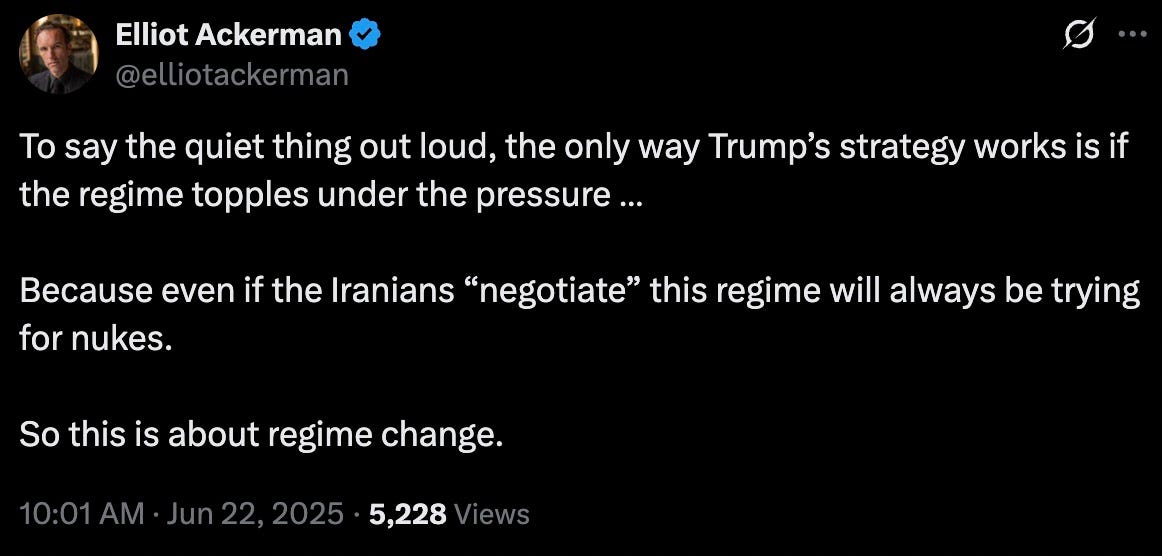Welcome to CrowdSource, your weekly guided tour of the latest intellectual disputes, ideological disagreements and national debates that piqued our interest (or inflamed our passions). This week: who wants regime change? What is “nation-building”?
Join us! CrowdSource features the best comments from The Crowd — our cherished readers and subscribers who, with their comments and emails, help make Wisdom of Crowds what it is.
Who Wants Regime Change?
The US bombed Iran. Should it try to overthrow the Iranian regime?
The US Should Push for Regime Change. So says former United Nations Ambassador John Bolton: “President Trump did the right thing for America in striking Iran's nuclear-weapons program. Now, on to regime change.”
“The Right Path to Regime Change.” Last week, co-authors Eric Edelman, Reuel Marc Gerecht and Ray Takeyh wrote: “Once Iran is disarmed, Israel and the United States might be tempted to walk away and look elsewhere. It is precisely at that moment that it should instead increase pressure on the regime. The United States must maintain sanctions and check Iran’s pathways into global commerce.”
The Iranian Regime Probably Won’t Fall, So We Will Need More War Later On. Argues American Enterprise Institute scholar Danielle Pletka: “Perhaps the regime will fall, though it seems a slim likelihood. … More likely, Iran will seek to reconstitute that which it lost over the last 21 months,” which “dooms the Iranian people to yet another cycle of violence down the road.”
Mission Objectives
As of this writing, it’s unclear whether regime change is the military objective of either Israel or the United States.
Is Regime Change the Military Objective for Israel?
No, says Israeli president Isaac Herzog.
No, Israeli Prime Minister Benjamin Netanyahu seemed to say.
Actually, Yes. Nonproliferation specialist Jeffrey Lewis writes: “These strikes weren’t primarily targeted at nuclear facilities, but at the top military leaders of the Islamic Republic. Israel isn’t trying to knock out Iran’s centrifuges; it’s trying to knock out the regime itself.”
Is Regime Change the Military Objective for the US?
No, says Secretary of Defense Pete Hegseth.
No, says Vice President Vance.
Maybe, says President Trump: “It’s not politically correct to use the term, ‘Regime Change’ but if the current Iranian Regime is unable to MAKE IRAN GREAT AGAIN, why wouldn’t there be a Regime change??? MIGA!!”
Actually, Yes. Atlantic writer Elliot Ackerman writes:
Regime Change Leads To Nation-Building
“Nation-building” is the bugaboo behind the debates over a US war on Iran.
If the Iranian regime falls, the US will be forced to manage and rebuild the country. So argues Sohrab Ahmari:
Should Israel continue on its current trajectory, including the targeting of the Islamic Republic’s civilian and energy infrastructure, it will break the Iranian state. But the Israelis are neither capable of, nor inclined to, pick up the pieces afterward. Rather, they will “internationalize” the problem. Which means: Uncle Sam, roll up your sleeves.
War and Consequences. Ahmari joined our podcast this week to discuss this article and more.
“If Iran Implodes.” Ross Douthat makes a similar argument: “I don’t see anything in the current nature of America’s relationship with the Gulf States or the Israelis to suggest that we wouldn’t be caught up in a postwar mess.”
Boots on the Ground? Statistician and philosopher Philippe Lemoine makes the case that US involvement will likely require a ground invasion.
“How Trump Could Lose This War.” Georgetown professor Dan Byman explains how limited strikes could become “messy.”
What is Nation-Building?
“Nation-building” is not a legal term — it’s policy jargon. According to international law, the victor in a war has certain postwar obligations.
The 1907 Hague Convention, for example, requires the victor “to restore, and ensure, as far as possible, public order and safety, while respecting, unless absolutely prevented, the laws in force in the country.”
The 1949 Geneva Convention stipulates: “the penal laws of the occupied territory shall remain in force, with the exception that they may be repealed or suspended … in cases where they constitute a threat to its security …”
The United States is a signatory of both the Hague Convention and Geneva Convention.
So-called nation-building entails all those obligations, plus more. It means changing the laws of the defeated nation. It means rebuilding the country from the ground up — for example, changing its constitution, replacing its civil service personnel and army, and even, perhaps, changing its flag.
Why Do People Keep Mentioning the Iraq War?
The United States tried all of those things in Iraq: changing its constitution, replacing its civil service personnel and army, changing its flag.
How Many People Died In the Iraq War? From the Iraq Family Health Survey Study Group: “Estimates of the death toll in Iraq from the time of the U.S.-led invasion in March 2003 until June 2006 have ranged from 47,668 (from the Iraq Body Count) to 601,027 (from a national survey). … we estimated that there were 151,000 violent deaths in Iraq during this period.”
How Many American Soldiers Died in the Iraq War? US Military Deaths: 4,419 total. However:
3,861 of those soldiers died after George W. Bush declared the end of major combat operations (in his famous “Mission Accomplished” address) on May 1, 2003.
In other words, the vast majority died during the postwar phase of the conflict, the moment when the obligations stipulated by international law come into play — what many called the nation-building phase.
This is why nation-building took on a near-pejorative status after that disastrous war.
Before Iraq, George W. Bush proclaimed himself against “nation-building,” before he famously changed his mind in the lead up to the war.
After Iraq, no president spoke highly of the concept:
Barack Obama said we need to focus on nation-building “here at home.”
Joe Biden said that nation-building in Afghanistan “never made any sense.”
Donald Trump denounced “nation-builders” last month.
From the Crowd
International Law is a Tool. Prolific Wisdom of Crowds commenter Michael D. Purzycki agrees with Damir Marusic’s article about the Israeli war in Iran and international law:
Well said, Damir. I see international law as a tool: one option among many, that states big and small can point to when it suits their interests.
So much of what we in the West think of as universal values or obligations only appear that way because the country that came out on top in 1945 said they were universal. And it’s not like immediate-post-World War II Westerners really, truly, thoroughly believed in universal human rights. The US was still rife with segregation, Europeans still subjugated Africans, etc.
There’s nothing inherently wrong with prioritizing some human lives over other human lives. That’s what humans do. Humanity sucks that way. The sooner liberals realize that, the better.
Legalism and Just War Theory. (anti)Social Engineer mostly agrees with Damir’s article, and argues that Israel’s attack is justified according to the principles of just war theory, if not international law:
I think this question doubly doesn’t matter because it’s not actually a question of international law as such but rather a pseudo-legalistic framing on what is actually a moral and prudential question: should Israel have attacked Iran’s nuclear sites, rather than can Israel do so under international law. Preemption and prevention are questions of jus ad bellum or “right to war.” Iran and Israel were already at war on June 12/13. That threshold had already been crossed.
The war between Israel and Iran began, arguably, On October 8, 2023 when Hezbollah joined in the attacks in Israel. There is, as yet, no hard evidence Iran knew what Hamas was planning on October 7th but they certainly had a hand in Hezbollah’s subsequent involvement, an act of war to which Israel, at least arguably, had a right to respond. One can debate the prudence of escalation by directly striking Iran when it is acting through proxies but even that argument fell by the wayside after Iran attacked Israel from its own soil on October 1 of last year. The two states have very clearly been in a state of war since then, at least. Thus, the question of preemption vs prevention, which is fundamentally a jus ad bellum question, does not come into play here. It is merely an attempt to lend a veneer of legalistic credibility to an argument over whether Israel should have taken this particular action in a war it was already engaged in.
If we take international law seriously at all then we are in the realm of jus in bello, or the “law of war” where the proper questions to ask are about military necessity, distinction, proportionality etc. These too are terms of art that often get abused in public discourse to lend a false sense of legal credibility to what are really moral and prudential arguments, but I digress. ... I think we need to acknowledge that the answers to questions like this can’t always turn on the minutiae of some minor point of law like the distinction between prevention and preemption. In the Wisdom of Crowds tradition, we need to dig deeper and interrogate first principles rather than appealing to misapplied legal frameworks that (at least) a significant portion of WoC doesn’t believe in anyway.
Wisdom of Crowds is a platform challenging premises and understanding first principles on politics and culture. Join us!





